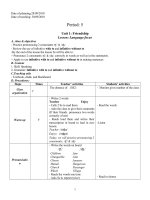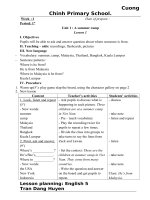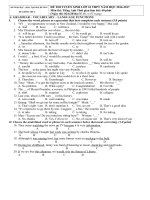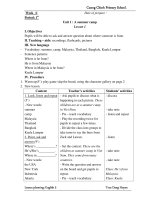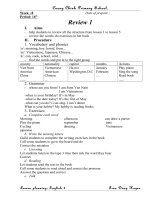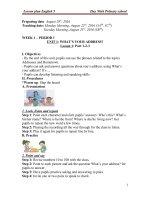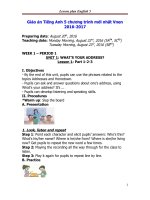Giáo án tiếng anh 5 chương trình mới vnen năm học 2016 2017
Bạn đang xem bản rút gọn của tài liệu. Xem và tải ngay bản đầy đủ của tài liệu tại đây (340.17 KB, 75 trang )
Lesson plan English 5
Duy Ninh Primary school
Preparing date: August 20th, 2016
Teaching date: Monday Morning, August 22nd, 2016 (5AT4, 5CT5)
Tuesday Morning, August 23rd, 2016 (5BT1)
WEEK 1 – PERIOD 1
UNIT 1: WHAT’S YOUR ADDRESS?
Lesson 1: Part 1-2-3
I. Objectives
- By the end of this unit, pupils can use the phrases related to the topics
Addresses and Hometown.
- Pupils can ask and answer questions about one’s address, using What’s
your address? It’s ...
- Pupils can develop listening and speaking skills.
II. Procedures
*Warm up: Slap the board
A. Presentation
1. Look, listen and repeat
Step 1: Point each character and elicit pupils’ answers: Who’s this? What’s
his/her name? Where is he/she from? Where is she/he living now? Get
pupils to repeat the new word a few times.
Step 2: Playing the recording all the way through for the class to listen.
Step 3: Play it again for pupils to repeat line by line.
B. Practice
2. Point and say
Step 1: Revise numbers 10 to 100 with the class.
Step 2: Point to each picture and ask the question What’s your address? for
pupils to answer.
Step 3: Have pupils practice asking and answering in pairs.
Step 4: Invite one or two pairs to speak to check.
1
Lesson plan English 5
Duy Ninh Primary school
C. Production
3. Let’s talk
Step 1: Get pupils to work in groups of four/five to ask each other’s
addresses.
Step 2: Set a time limit for the class to practice.
Step 3: Invite a few pupils to repeat their interviews to the class.
D. Application
- Learn by heart the new words.
- Prepare the next period: Unit 1: Lesson 1: Part 4,5,6
2
Lesson plan English 5
Duy Ninh Primary school
Preparing date: August 20th, 2016
Teaching date: Monday Afternoon, August 22nd, 2016 (5AT2)
Wednesday Morning, August 24th, 2016 (5BT3)
Thursday Morning, August 25th, 2016 (5CT3)
WEEK 1 – PERIOD 2
UNIT 1: WHAT’S YOUR ADDRESS?
Lesson 1: Part 4-5-6
I. Objectives
- By the end of this unit, pupils can use the phrases related to the topics
Addresses and Hometown.
- Pupils can ask and answer questions about one’s address, using What’s
your address? It’s ...
- Pupils can develop speaking, listening and reading skills.
II. Procedures
*Warm up: Revising the story in Activity 1
A. Presentation
4. Listen and complete
Step 1: Playing the recording all the way through for pupils to listen.
Step 2: Play it again for them to do the task.
Step 3: Get them to compare their answers.
Step 4: Play the recording again to confirm the answers.
Key: 1. 208 2. 321
3. White Street
4. The second floor
B. Practice
5. Read and complete
Step 1: Give pupils a few seconds to read the sentences.
Step 2: Set a time limit for pupils to do the task independently.
Step 3: Get pupils to compare their answers in pair before checking as a
class.
Key: 1. from
2 lives 3 address
4 Street
3
Lesson plan English 5
Duy Ninh Primary school
C. Production
6. Let’s sing
Step 1: Have pupils read the lyrics and teach the unfamiliar words.
Step 2: Play the recording all the way through for pupils to listen.
Step 3: Play it again for pupils to repeat line by line.
Step 4: Have pupils practice singing and doing action in groups.
Step 5: Invite a group to sing the song and do actions.
D. Application
- Learn by heart the sing.
- Prepare the next period: Unit 1: Lesson 2: Part 1,2,3.
4
Lesson plan English 5
Duy Ninh Primary school
Preparing date: August 21st, 2016
Teaching date: Tuesday Morning, August 23rd, 2016 (5AT4)
Wednesday Morning, August 24th, 2016 (5BT4)
Thursday Morning, August 25th, 2016 (5CT4)
WEEK 1 – PERIOD 3
UNIT 1: WHAT’S YOUR ADDRESS?
Lesson 2: Part 1-2-3
I. Objectives
- By the end of this unit, pupils can use the phrases related to the topics
Addresses and Hometown.
- Pupils can ask and answer questions about what a village/town/city is like,
using What’s the … like? It’s …
- Pupils can develop speaking and listening skills.
II. Procedures
*Warm up: Have the class sing The wheels on the bus.
A. Presentation
1. Look, listen and repeat
Step 1: Point at each picture to elicit pupils’ answers: What’s his name?
Who’s he talking with? Get pupils to repeat the new word a few times.
Step 2: Playing the recording all the way through for the class to listen.
Step 3: Play it again for pupils to repeat the lines in the bubbles.
B. Practice
2. Point and say
Step 1: Revise the adjectives big, far, large and small and teach the new
ones: busy, quiet, crowded, pretty.
Step 2: Point to each picture and ask the question What’s the … like? for
pupils to answer.
Step 3: Have pupils practice asking and answering in pairs.
Step 4: Invite one or two pairs to speak to check.
5
Lesson plan English 5
Duy Ninh Primary school
C. Production
3. Let’s talk
Step 1: Set a time limit for the class to practice.
Step 2: Invite one or two pairs to act out their conversations.
D. Application
- Prepare the next period: Unit 1: Lesson 2: Part 4,5,6
6
Lesson plan English 5
Duy Ninh Primary school
Preparing date: August 22nd, 2016
Teaching date: Wednesday Afternoon, August 24th, 2016 (5AT1)
Thursday Morning, August 25th, 2016 (5BT1)
Friday Afternoon, August 26th, 2016 (5CT3)
WEEK 1 – PERIOD 4
UNIT 1: WHAT’S YOUR ADDRESS?
Lesson 2: Part 4-5-6
I. Objectives
- By the end of this unit, pupils can use the phrases related to the topics
Addresses and Hometown.
- Pupils can develop listening and writing skills.
II. Procedures
*Warm up: Play Bingo
A. Presentation
4. Listen and circle a or b
Step 1: Ask pupils to read the sentences and guess the correct answers.
Step 2: Playing the recording all the way through for pupils to listen.
Step 3: Play it again for them to do the task.
Step 4: Get them to compare their answers.
Key: 1a 2b 3b 4a
B. Practice
5. Write about you
Step 1: Have pupils read the questions and check their understanding.
Step 2: Set a time limit for them to do the task.
Step 3: Get them to swap and read their writing.
Step 4: Invite one or two pupils to read their answers aloud and give
feedback.
7
Lesson plan English 5
Duy Ninh Primary school
C. Production
6. Let’s play
Step 1: Compare the two pictures.
Step 2: Find out the five details which are different.
Key: Picture b is different from Picture a:
- There is one more car in the road.
- There is a woman in front of the yellow building.
- The sign next to the yellow building is blue, and it reads BUS STOP.
- There is no logo of pills on the pharmacy.
- There is a boy behind the father and daughter.
D. Application
- Learn by heart the new words.
- Prepare the next period: Unit 1: Lesson 3: Part 1,2,3
8
Lesson plan English 5
Duy Ninh Primary school
Preparing date: September 3rd, 2016
Teaching date: Monday Morning, September 5th, 2016 (5AT4, 5CT5)
Tuesday Morning, September 6th, 2016 (5BT1)
WEEK 2 – PERIOD 5
UNIT 1: WHAT’S YOUR ADDRESS?
Lesson 3: Part 1-2-3
I. Objectives
- By the end of this unit, pupils can use the phrases related to the topics
Addresses and Hometown.
- Pupils can pronounce two-syllable words with the stress on the first
syllable: ‘city, ‘village, ‘mountain, and ‘tower
- Pupils can develop listening and speaking skills.
II. Procedures
*Warm up: Invite a few pupils to read their answers to Activity 5.
A. Presentation
1. Listen and repeat
Step 1: Explain that in a word with more than one syllable, one of the
syllables is usually said with more emphasis than the rest.
Step 2: Playing the recording all the way through for pupils to listen.
Step 3: Play it again for them to repeat all the words and sentences twice.
B. Practice
2. Listen and circle a or b. Then say the sentences.
Step 1: Ask pupils to read the sentences in silent.
Step 2: Playing the recording all the way through for pupils to listen.
Step 3: Play it again for them to do the task.
Step 4: Get them to compare their answers.
Key: 1b 2a 3a
9
Lesson plan English 5
Duy Ninh Primary school
C. Production
3. Let’s chant
Step 1: Have pupils read the chant.
Step 2: Play the recording all the way through for pupils to listen.
Step 3: Play it again for pupils to repeat line by line.
Step 4: Have pupils practice chanting and doing action in groups.
Step 5: Invite two or three groups to say the chant and do actions.
D. Application
- Learn by heart the new words.
- Prepare the next period: Unit 1: Lesson 1: Part 4,5,6,7
10
Lesson plan English 5
Duy Ninh Primary school
Preparing date: September 3rd, 2016
Teaching date: Monday Afternoon, September 5th, 2016 (5AT2)
Wednesday Morning, September 7th, 2016 (5BT3)
Thursday Morning, September 8th, 2016 (5CT3)
WEEK 2 – PERIOD 6
UNIT 1: WHAT’S YOUR ADDRESS?
Lesson 3: Part 4-5-6-7
I. Objectives
- By the end of this unit, pupils can use the phrases related to the topics
Addresses and Hometown.
- Pupils can ask and answer questions about one’s address and about what a
village/town/city is like.
- Pupils can develop pupils’ reading and writing skills.
II. Procedures
*Warm up: Have the class say the chant Where do you live?
A. Presentation
1. Read and tick Yes or No
Step 1: Get pupils to read the sentence and underline the key words/phrases.
Step 2: Set a time limit for pupils to do the task independently.
Step 3: Have them compare their answers.
Key: 1N 2Y 3N 4Y 5Y
B. Practice
5. Write about your friend
Step 1: Give pupils time to read the questions.
Step 2: Set s time limit for them to do the task independently.
Step 3: Get them to swap and read their writing in pairs.
Step 4: Invite two or three pupils to read their answers aloud
11
Lesson plan English 5
Duy Ninh Primary school
C. Production
6. Project
Step 1: Discuss the house they are going to draw, and its address.
Step 2: Set a time limit for them to do the task.
Step 3: Invite a few groups to present their drawing to the class and talk
about them.
7. Colour the stars
Step 1: Have the class read the statements and check their comprehension.
Step 2: Give them time to colour the stars and invite a few pupils to read the
statement aloud.
D. Application
- Learn by heart the new words.
- Prepare the next period: Unit 2: Lesson 1: Part 1,2,3
12
Lesson plan English 5
Duy Ninh Primary school
Preparing date: September 4th, 2016
Teaching date: Tuesday Morning, September 6th, 2016 (5AT4)
Wednesday Morning, September 7th, 2016 (5BT4)
Thursday Morning, September 8th, 2016 (5CT4)
WEEK 2 – PERIOD 7
UNIT 2: I always get up early. How about you?
Lesson 1: Part 1-2-3
I. Objectives
- By the end of this unit, pupils can use words and phrases related to the
topic Daily routines.
- Pupils can ask and answer questions about someone’s daily routine, using
What do you do….? I always/ usually/ often/ sometimes …
- Pupils can develop reading, listening and speaking skills.
II. Procedures
*Warm up: Have the class talk about their houses.
A. Presentation
1. Look, listen and repeat
Step 1: Point each character and elicit pupils’ answers: Who’s this? What’s
he doing? What does he do in the morning? Get pupils to repeat the new
word a few times.
Step 2: Playing the recording all the way through for the class to listen.
Step 3: Play it again for pupils to repeat line by line.
Step 4: Check their understanding of the story.
B. Practice
2. Point and say
Step 1: Have pupils look at the pictures.
Step 2: Teach them how to read the words and phrases under each picture.
Step 3: Have pupils practice asking and answering in pairs.
Step 4: Invite one or two pairs to speak to check.
13
Lesson plan English 5
Duy Ninh Primary school
C. Production
3. Let’s talk
Step 1: Get pupils to work in pairs by asking and answering questions about
someone’s daily routines.
Step 2: Set a time limit for the class to practice.
Step 3: Invite a few pairs to act out their conversations.
D. Application
- Learn by heart the new words.
- Prepare the next period: Unit 2: Lesson 1: Part 4,5,6
14
Lesson plan English 5
Duy Ninh Primary school
Preparing date: September 5th, 2016
Teaching date: Wednesday Afternoon, September 7th, 2016 (5AT1)
Thursday Morning, September 8th, 2016 (5BT1)
Friday Afternoon, September 9th, 2016 (5CT3)
WEEK 2 – PERIOD 8
UNIT 2: I always get up early. How about you?
Lesson 1: Part 4-5-6
I. Objectives
- By the end of this unit, pupils can use words and phrases related to the
topic Daily routines.
- Pupils can ask and answer questions about someone’s daily routine.
- Pupils can develop reading and listening skills.
II. Procedures
*Warm up: Spend a few minutes revising the previous lesson.
A. Presentation
1. Listen and tick
Step 1: Ask pupils to look at the pictures to identify the characters and their
activities.
Step 2: Playing the recording all the way through for pupils to listen and tick
the pictures.
Step 3: Play it again for them to check their answers.
Step 4: Get them to compare their answers.
Key: 1c 2b 3b 4a
B. Practice
5. Read and complete
Step 1: Give pupils a few seconds to read the text and the words in the box.
Step 2: Set a time limit for pupils to do the task independently.
Step 3: Get pupils to compare their answers in pair before checking as a
class.
Key: 1 do
2 usually 3 play
4 TV 5 like
15
Lesson plan English 5
Duy Ninh Primary school
C. Production
6. Let’s sing
Step 1: Have pupils read the lyrics and teach the unfamiliar words.
Step 2: Play the recording all the way through for pupils to listen.
Step 3: Play it again for pupils to repeat line by line.
Step 4: Have pupils practice singing and doing action in groups.
Step 5: Invite a group to sing the song and do actions.
D. Application
- Learn by heart the new words.
- Prepare the next period: Unit 2: Lesson 2: Part 1,2,3
16
Lesson plan English 5
Duy Ninh Primary school
Preparing date: September 10th, 2016
Teaching date: Monday Morning, September 12th, 2016 (5AT4, 5CT5)
Tuesday Morning, September 13th, 2016 (5BT1)
WEEK 3 – PERIOD 9
UNIT 2: I always get up early. How about you?
Lesson 2: Part 1-2-3
I. Objectives
- By the end of this unit, pupils can use words and phrases related to the
topic Daily routines.
- Pupils can ask and answer questions about frequency, using How often...?
- Pupils can develop speaking and listening skills.
II. Procedures
*Warm up: Spend a few minutes revising the previous lesson by having the
class sing the song This is the way we do things.
A. Presentation
1. Look, listen and repeat
Step 1: Point at each picture to elicit their answers to these questions:
What’s his/her name? What’s he/she talking about? Get pupils to repeat the
new word a few times.
Step 2: Playing the recording all the way through for the class to listen.
Step 3: Play it again for pupils to repeat line by line..
B. Practice
2. Point and say
Step 1: Point at each picture and ask How often do you ….? to get the class
to answer.
Step 3: Ask pupils to work in pairs.
Step 4: Invite one or two pairs to perform the activity.
17
Lesson plan English 5
Duy Ninh Primary school
C. Production
3. Let’s talk
Step 1: Get pupils to work in pair.
Step 2: Set a time limit for the class to practice.
Step 3: Invite a few pairs to ask and answer questions.
D. Application
- Learn by heart the new words.
- Prepare the next period: Unit 2: Lesson 2: Part 4,5,6
18
Lesson plan English 5
Duy Ninh Primary school
Preparing date: September 10th, 2016
Teaching date: Monday Afternoon, September 12th, 2016 (5AT2)
Wednesday Morning, September 14th, 2016 (5BT3)
Thursday Morning, September 15th, 2016 (5CT3)
WEEK 3 – PERIOD 10
UNIT 2: I always get up early. How about you?
Lesson 2: Part 4-5-6
I. Objectives
- By the end of this unit, pupils can use words and phrases related to the
topic Daily routines.
- Pupils can ask and answer questions about frequency, using How often...?
- Pupils can develop writing and listening skills.
II. Procedures
*Warm up: Spend a few minutes revising the previous lesson by having a
few pairs of pupils ask and answer the questions: How often…..?
A. Presentation
4. Listen and number
Step 1: Ask pupils to look at the pictures and identify the characters and
their activities.
Step 2: Playing the recording all the way through for pupils to listen.
Play it again for them to check their answers.
Step 3: Get them to compare their answers.
Step 4: Play the recording again to confirm the answers.
Key: a4 b1 c2 d3
B. Practice
5. Write about your daily routines
Step 1: Have pupils read the questions and check their understanding.
Step 2: Set a time limit for them to do the task.
Step 3: Get them to swap and read each other’s answers.
19
Lesson plan English 5
Duy Ninh Primary school
C. Production
6. Let’s play
Step 1: Get pupils to look at the crossword puzzle and the pictures.
Step 2: Ask pupils to work independently.
Step 3: Have the class make sentences with the words and phrases from the
puzzle.
Key: 1 get dressed 2 cook dinner 3 have lunch 4 do homework
5 go home 6 go to bed 7 listen to music 8 get up 9 go to school
D. Application
- Learn by heart the new words.
- Prepare the next period: Unit 2: Lesson 3: Part 1,2,3
20
Lesson plan English 5
Duy Ninh Primary school
Preparing date: September 11th, 2016
Teaching date: Tuesday Morning, September 13th, 2016 (5AT4)
Wednesday Morning, September 14th, 2016 (5BT4)
Thursday Morning, September 15th, 2016 (5CT4)
WEEK 3 – PERIOD 11
UNIT 2: I always get up early. How about you?
Lesson 3: Part 1-2-3
I. Objectives
- By the end of this unit, pupils can use words and phrases related to the
topic Daily routines.
- Pupils can pronounce two-syllable words with the stress on the first
syllable.
- Pupils can develop listening skill.
II. Procedures
*Warm up: Spend a few minutes revising the previous lesson
A. Presentation
1. Listen and repeat
Step 1: Play the recording all the way through for pupils to listen first.
Step 2: Play it again for them to repeat the words and sentences twice.
B. Practice
2. Listen and circle a or b. Then say the sentences aloud.
Step 1: Ask pupils to read the sentences in silent.
Step 2: Playing the recording all the way through for pupils to listen.
Step 3: Play it again for them to do the task.
Step 4: Get them to compare their answers and read the completed sentences
aloud.
Key: 1a 2b 3a 4b
21
Lesson plan English 5
Duy Ninh Primary school
C. Production
3. Let’s chant
Step 1: Have pupils read the chant.
Step 2: Play the recording all the way through for pupils to listen.
Step 3: Play it again for pupils to repeat line by line.
Step 4: Have pupils practice chanting and doing action in groups.
Step 5: Invite two or three groups to say the chant and do actions.
D. Application
- Learn by heart the new words.
- Prepare the next period: Unit 2: Lesson 3: Part 4,5,6,7
22
Lesson plan English 5
Duy Ninh Primary school
Preparing date: September 12th, 2016
Teaching date: Wednesday Afternoon, September 14th, 2016 (5AT1)
Thursday Morning, September 15th, 2016 (5BT1)
Friday Afternoon, September 16th, 2016 (5CT3)
WEEK 3 – PERIOD 12
UNIT 2: I always get up early. How about you?
Lesson 3: Part 4-5-6-7
I. Objectives
- By the end of this unit, pupils can use words and phrases related to the
topic Daily routines; can ask and answer questions about someone’s daily
routine and about frequency.
- Pupils can develop reading and writing skills.
II. Procedures
*Warm up: Spend a few minutes having the class say the chant What do
you do in the morning?
A. Presentation
4. Read and answer
Step 1: Give pupils a few seconds to look at the pictures and ask: Who’s
this? What’s she doing? What’s she watching?
Step 2: Set a time limit for pupils to read the text and do the task
independently.
Step 3: Have pupils compare their answers.
Keys: 1 She gets up early and usually goes jogging.
2 She usually does her homework. Then she often plays badminton and
sometimes cooks dinner.
3 She watches English for Kids (once a week).
4 She goes shopping twice a week.
B. Practice
5. Write about your friend
Step 1: Give pupils time to read and complete the sentences.
Step 2: Set s time limit for them to do the task independently.
Step 3: Get pupils to read their writing in pairs.
23
Lesson plan English 5
Duy Ninh Primary school
C. Production
6. Project
Step 1: Interview two classmates about their daily routines.
Step 2: Get one or two pupils to report the results to the class.
Name
What does he/she do
in the morning?
What does he/she do
in the afternoon?
What does he/she do
in the evening?
1.
2.
7. Colour the stars
Step 1: Have the class read the statements and check their comprehension.
Step 2: Give them time to colour the stars and invite a few pupils to read the
statement aloud.
D. Application
- Learn by heart the new words.
- Prepare the next period: Unit 3: Lesson 1: Part 1,2,3
24
Lesson plan English 5
Duy Ninh Primary school
Preparing date: September 17th, 2016
Teaching date: Monday Morning, September 19th, 2016 (5AT4, 5CT5)
Tuesday Morning, September 20th, 2016 (5BT1)
WEEK 4 – PERIOD 13
UNIT 3: WHERE DID YOU GO ON HOLIDAY?
Lesson 1: Part 1-2-3
I. Objectives
- By the end of this unit, pupils can use the words and phrases related to the
topics Past holidays and Means of transport.
- Pupils can ask and answer questions about past holidays.
- Pupils can develop listening and speaking skills.
II. Procedures
*Warm up: Have pupils play with the words and pictures of car, bike,
plane, ship…..
A. Presentation
1. Look, listen and repeat
Step 1: Ask pupils to look at the pictures to identify the characters and the
context in which the language is used. Get pupils to repeat the new word a
few times.
Step 2: Playing the recording all the way through for the class to listen.
Step 3: Play it again for pupils to repeat line by line.
B. Practice
2. Point and say
Step 1: Point to each picture and ask the question Where did you go on
holiday? for pupils to answer I went to Ha Long Bay.
Step 2: Ask the class to practice in pairs.
Step 3: Invite some pairs to act out the dialogues.
25
